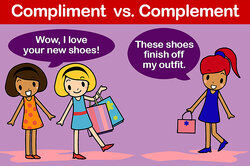
Complement and compliment are list-toppers in the world of commonly confused words. Do you pay someone a compliment? Or do you complement them on their new dress? (The correct answer to both those questions is “compliment.”) If you’re wondering how to use complement and compliment correctly, buckle up. Let’s take a closer look at how to tell the difference between the two and how to use each word correctly.
Homophones and Definitions
Before we get into how to use these words correctly, let’s discuss what they are. Complement and compliment are homophones. They sound the same, but have distinctly different meanings and spellings.
Complement
Complement, when used as a noun, means something makes another thing complete. Here’s an example sentence:
These red shoes are a great complement to my lace dress.
When used as a verb, to complement means to make something complete. Here’s another sentence:
These shoes complement my entire look.
Compliment
Compliment, when used as a noun, represents the act of giving praise. Here’s an example sentence:
He offered a kind compliment to the chef of the restaurant.
When used as a verb, to compliment means to give praise. For example:
He will always compliment her when she brings home a great report card.
These two words are often misspelled not because we’ve confused the letter arrangement, but because we’ve used the wrong form. Check out these 100 most often misspelled words in English. Sometimes, they’re misspelled because they don’t follow conventional spelling rules. Other times, they’re misspelled because we’ve chosen the wrong form.
Example Sentences With Complement
Complement with an “e” has to do with completion. Either one thing is a completion of another thing, or one thing is actively completing another. Whether in its noun or verb form, it’s always about completion.
One way to remember the difference is to consider the common letters here. To complEment something is to complEte something. Here are some sample sentences:
- Mott’s apple juice is a good complement to this grilled cheese sandwich.
- This buttery yellow paint will complement the white lace curtains.
- I can’t get over how much David and Marie complement each other.
- Do you think the white tulip complements this flower arrangement?
- The assorted olives are complements to our cheese selection.
Example Sentences With Compliment
Meanwhile, compliment with an “i” is all about praise. You can offer a compliment (noun) or actively compliment someone (verb). One way to remember the difference is to consider that compliment with the letter "i" means praise, as in "I" give a compliment.
Let’s walk through some example sentences. It’ll drive the point home and complement your grammar skills.
- Did he just compliment her handwriting?
- The fact that he likes my writing is a major compliment.
- Don’t just compliment me! Get in here and lend a hand!
- A wise teacher compliments her students whenever they reach a new level of learning.
- Well, she’s just full of compliments today!
Ready for our next round of 100 more often misspelled words?
Complementary vs. Complimentary
“Complementary” and “complimentary” unite when they take on their adjectival form. Whether you’re discussing the manner in which one thing completes something else or a praiseworthy moment, once the suffix -ary is added, we officially have an adjective in the house.
This workbook is quite complementary to the textbook.
Note here that “complementary” is modifying the noun “workbook.” The workbook is completing the textbook, making the total learning experience more complete.
I’m suspicious of her overly complimentary remarks.
In this sentence, “complimentary” is modifying the noun “remarks.” The heaps of praise are suspiciously over-the-top.
Complimentary Means Free
Another common use of the word “complimentary” is to indicate that something is free or included. This functions in the same way as when you might say, “These appetizers are compliments of the chef.”
The hotel offers complimentary breakfast.
Complementary Word Play
These two homophones are certainly complementary to a life filled with word play. But, don’t stop with this pair. There are many different types of words with multiple meanings. We have homonyms, homophones, and homographs. Each of them are shifty shapeshifters. And, once you’ve mastered the lookalikes of the universe, move on to 150 more often misspelled words. Your teacher will surely compliment you on your impeccable spelling skills!